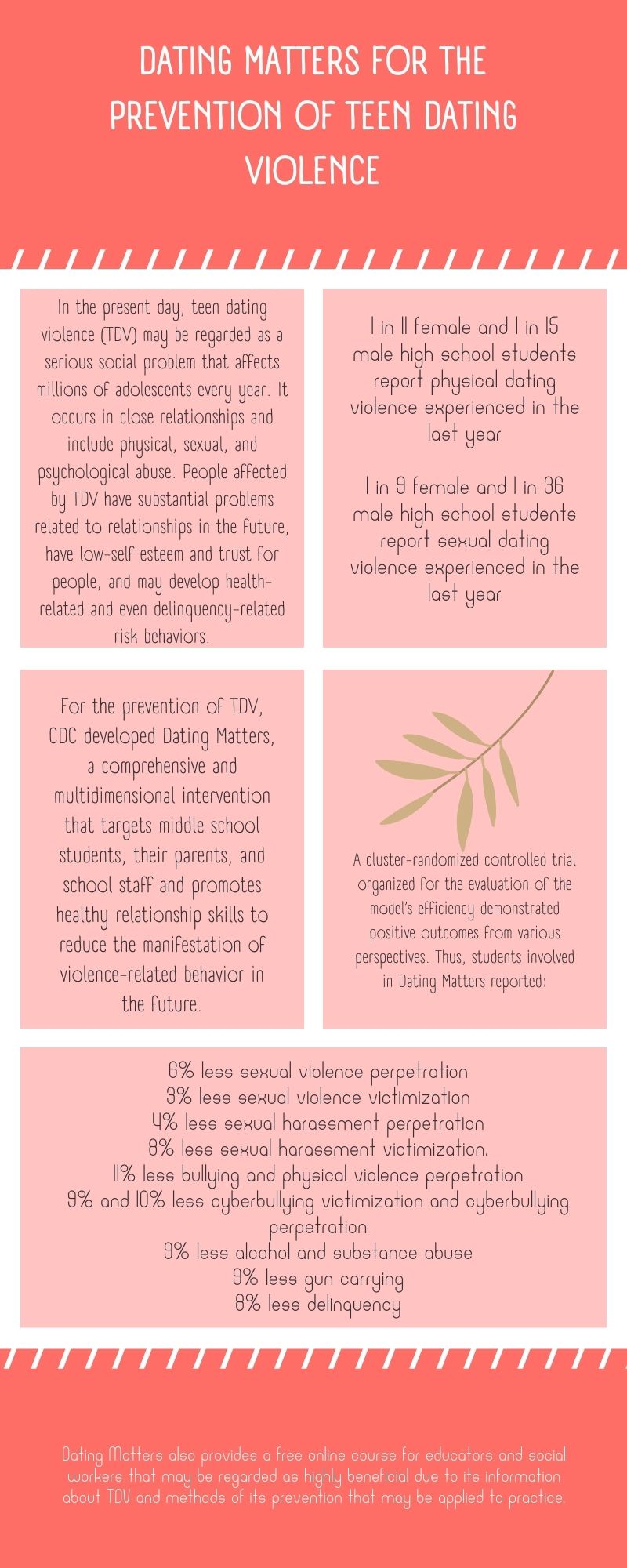Articles under analysis address teen dating violence (TDV) that may be regarded as a relatively serious social issue. Its significance is determined by the fact that physical, sexual, and psychological violence that occurs in relationships has a highly negative impact on adolescents’ health and well-being and may affect their lives in the future. In general, all articles are dedicated to the evaluation of the efficiency of Dating Matters, a comprehensive and multidimensional intervention developed by the Centers for Disease Control and Prevention (CDC) for the mitigation of the problem of TDV. Moreover, they are based on one longitudinal stratified cluster-randomized controlled trial as its scope provided scientists with large amounts of information for the intervention’s assessment (Vivolo-Kantor et al., 2021). For it, 3301 students from 46 middle schools that serve particularly high-risk communities characterized by the prevalence of economic hardship and violent crimes were randomly chosen to receive either the Dating Matters or a standard model (Vivolo-Kantor et al., 2021; DeGue et al., 2021). Data was collected biannually during four school years to compare a new intervention with a traditional one to define the former’s effectiveness.
All articles are considerably similar as they aim to evaluate the feasibility and efficiency of Dating Matters, address the same population (6th-8th grade students), and even use the same sampling in the same settings. However, on the basis of available data, all articles focused on different perspectives and spheres where Dating Matters could be associated with positive outcomes. Thus, Vivolo-Kantor et al. (2021) examined how the implementation of Dating Matters in middle schools contributes to the prevention of physical violence, bullying, and cyberbullying among adolescents. In turn, DeGue et al. (2021) addressed the effectiveness of Dating Matters for the prevention of sexual harassment and sexual violence in teens’ relationships. Finally, Estefan et al. (2021) evaluated the impact of the intervention on delinquency-related and health-related risk behaviors. Nevertheless, all articles demonstrated the effectiveness of Dating Matter in relation to perspectives they addressed.
For this quantitative research on the basis of cluster-randomized controlled trial, 3301 6th-8th students from 46 middle schools in high-risk sites were randomly chosen to receive either Dating Matters model or a standard TDV prevention program for at least two academic years. Dating Matters included classroom-delivered, community-based, and youth communications programs for students and their parents, training for school staff, and community-based activities (DeGue et al., 2021). Data was collected biannually during four academic years through surveys for subsequent analysis. According to the results, students who received Dating Matters reported 6% less sexual violence perpetration, 3% less sexual violence victimization, 4% less sexual harassment perpetration, and 8% less sexual harassment victimization.
This quantitative research addressed the same cluster-randomized controlled trial with 3301middle school students from 46 schools that served high-risk communities in urban sites across the country. Participants were randomly chosen to receive either Dating Matters or a standard-of care program for the prevention of TDV for two academic years. Participants were slightly predominantly females (53% against 47% of males) and predominantly Black, non-Hispanic, and Hispanic (Vivolo-Kantor et al., 2021). During four school years, biannual surveys were organized for students involved in the program to analyze collected data and evaluate the intervention’s impact. According to the results, in comparison with a standard model, Dating Matters contributed to 11% less bullying and physical violence perpetration. In addition, female participants reported 9% and 10% less cyberbullying victimization and cyberbullying perpetration, respectively.
This qualitative research used the same sampling, settings, and methods as previous studies as it addressed the efficiency of Dating Matters on the basis of the same experiment. 3301 students from 6th-8th grades, predominantly female (53%) and Blacks (50%) received either a standard program or Dating Matters to assess the latter’s efficiency for the prevention of risk behaviors. They were surveyed twice a year, and collected and analyzed data demonstrated that Dating Matters lowed the levels of alcohol and substance abuse (9%), gun carrying (9%), and delinquency (8%) in middle school.
In general, all three articles provided evidence that Dating Matters is more effective in comparison with standard programs. In addition, it prevents not only TDV but a wide range of social issues associated with adolescents, including health-related and delinquency-related risk behaviors and cyberbullying. All in all, Dating Matters helps teens create not only healthy relationships but improve interactions with other people. Thus, knowledge and skills received in the program will benefit students’ school period and future life as well.

References
CDC (2018). Dating Matters.
Dating Matters: Understanding teen dating violence prevention. (n.d.).
DeGue, S., Niolon, P. H., Estefan, L. F., Tracy, A. J., Le, V. D., Vivolo-Kantor, A. M., Little, T. D., Latzman, N. E., Tharp, A., Lang, K. M., & Taylor, B. (2021). Effects of Dating Matters® on sexual violence and sexual harassment outcomes among middle school youth: A cluster-randomized controlled trial. Prevention Science, 22(2), 175-185.
Estefan, L. F., Vivolo-Kantor, A. M., Niolon, P. H., Le, V. D., Tracy, A. J., Little, T. D., DeGue, S., Latzman, N. E., Tharp, A., Lang, K. M., & McIntosh, W. L. (2021). Effects of the Dating Matters® comprehensive prevention model on health- and delinquency-related risk behaviors in middle school youth: A cluster-randomized controlled trial. Prevention Science, 22, 163-174.
Vivolo-Kantor, A. M., Niolon, P. H., Estefan, L. F., Le, V. D., Tracy, A. J., Latzman, N. E., Little, T. D., Lang, K. M., DeGue, S., & Tharp, A. T. (2021). Middle school effects of the Dating Matters® comprehensive teen dating violence prevention model on physical violence, bullying, and cyberbullying: A cluster-randomized controlled trial. Prevention Science, 22(2), 151-161.